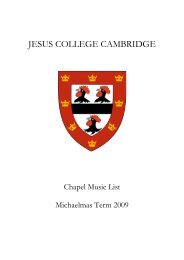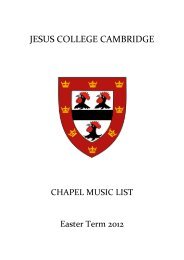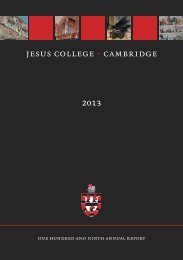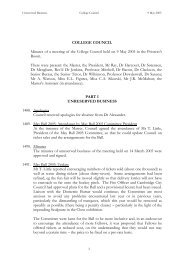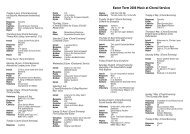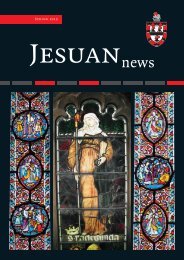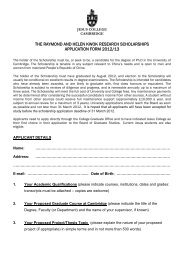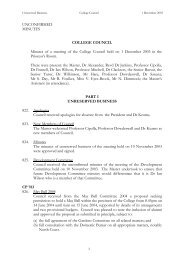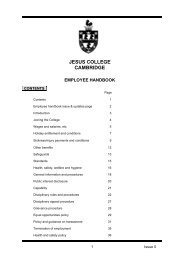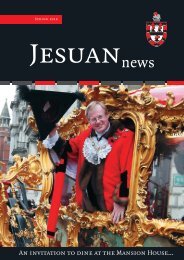2012 Annual Report - Jesus College - University of Cambridge
2012 Annual Report - Jesus College - University of Cambridge
2012 Annual Report - Jesus College - University of Cambridge
Create successful ePaper yourself
Turn your PDF publications into a flip-book with our unique Google optimized e-Paper software.
Rustat Conferences<br />
John Cornwell<br />
COLLEGE NEWS I <strong>Jesus</strong> <strong>College</strong> <strong>Annual</strong> <strong>Report</strong> <strong>2012</strong> 81<br />
On 17 January <strong>2012</strong> The Master and the Vice-Chancellor, Pr<strong>of</strong>essor Sir Leszeck<br />
Borysiewicz, hosted a conference in Upper Hall on the Future <strong>of</strong> Research Intensive<br />
Universities. The Master’s Executive Summary was as follows:<br />
The last 40 years have witnessed an unprecedented expansion <strong>of</strong> the university sector<br />
within the UK, not only in terms <strong>of</strong> its size but also in terms <strong>of</strong> its range <strong>of</strong> academic<br />
endeavours, teaching, research, consultancy and contractual work, community<br />
engagement and commercialisation. The academic attainment <strong>of</strong> applicants has also<br />
broadened hugely, partly due to their much larger numbers and to the changes in school<br />
curriculum. As a result, higher education organisations now not only embrace the<br />
approach outlined by von Humboldt (1810), treating “higher learning in terms <strong>of</strong> not yet<br />
completely solved problems, remaining at all times in a research mode (i.e. being engaged in an<br />
unceasing process <strong>of</strong> inquiry)”, but also as conventionally in Schools and <strong>College</strong>s educating<br />
and training students in “closed and settled bodies <strong>of</strong> knowledge”.<br />
While recognising that both forms <strong>of</strong> education are important to Society, this Rustat<br />
Conference sought to chart the major issues currently confronting Research-Intensive<br />
universities specifically, paying particular attention to the changing landscape <strong>of</strong><br />
government scrutiny and support, and the rapid advances globally in universities.<br />
Throughout the conference, it was recognised that the UK university system includes<br />
internationally leading institutions which surpass those in many competitor nations,<br />
and are seen to be particularly impressive when their performance is assessed in terms<br />
<strong>of</strong> unit resource. It was agreed that the following factors had been essential in such<br />
success: (i) Institutional Autonomy, a feature that other countries are now introducing in<br />
Honora O’Neill, Henrietta Moore, Nancy Rothwell, David Cleevely, Martin Rees, the Vice-Chancellor and the Master at the<br />
Rustat Conference on Research Universities, 29 January <strong>2012</strong>



